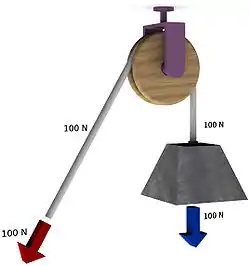pulley
See also: Pulley
English

A fixed pulley assembly
Etymology
From Middle English puly, poley, from Old French poulie, polie (“a pulley, windlass”), from Medieval Latin polidia, plural mistaken for the feminine of neuter polidium, from Ancient Greek πολίδιον (polídion, “little pivot”), diminutive of πόλος (pólos, “pivot, hinge, axis”), from Proto-Indo-European *kʷel- (“to turn”). Associated with pull (verb) by folk etymology.
Pronunciation
- IPA(key): /ˈpʊli/
Audio (US) (file) - Rhymes: -ʊli
Noun
pulley (plural pulleys or (obsolete) pullies)
- (engineering, countable) One of the simple machines; a sheave, a wheel with a grooved rim, in which a pulled rope or chain lifts an object (more useful when two or more pulleys are used together, as in a block and tackle arrangement, such that a small force moving through a greater distance can exert a larger force through a smaller distance).
- 1726 October 28, [Jonathan Swift], “The Author Gives Some Account of Himself and Family, His First Inducements to Travel. […]”, in Travels into Several Remote Nations of the World. […] [Gulliver’s Travels], volume I, London: […] Benj[amin] Motte, […], →OCLC, part I (A Voyage to Lilliput), page 20:
- Nine hundred of the ſtrongeſt Men were employed to draw up theſe Cords by many Pulleys faſtned on the Poles, and thus, in leſs than three Hours, I was raiſed and flung into the Engine, and there tyed faſt.
Hypernyms
Hyponyms
Coordinate terms
Translations
one of simple machines
|
References
Verb
pulley (third-person singular simple present pulleys, present participle pulleying, simple past and past participle pulleyed)
- (transitive) To raise or lift by means of a pulley.
- 1655, James Howell, “To Capt. Francis Bacon”, in Epistolæ Ho-Elianæ. Familiar Letters Domestic and Forren. […], 3rd edition, volume (please specify the page), London: […] Humphrey Mos[e]ley, […], →OCLC:
- [a mine]is digg'd out with ease, being soft, and is between a white Clay and Chalk at first; but being pulley'd up with the open Air, it receives a crusty kind of hardness
This article is issued from Wiktionary. The text is licensed under Creative Commons - Attribution - Sharealike. Additional terms may apply for the media files.